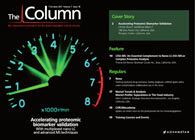$1.2 million NASA grant for chromatographer
Purnendu ?Sandy? Dasgupta, a chemistry professor at the University of Arlington in Texas, USA, has been awarded a $1.2 million grant from NASA , according to a press release from the University?s website.

Purnendu “Sandy” Dasgupta, a chemistry professor at the University of Arlington in Texas, USA, has been awarded a $1.2 million grant from NASA , according to a press release from the University’s website.
The project entitled “An Ion Chromatograph for Extraterrestrial Explorations” aims to overcome the problems associated with previous testing methods to test Martian soils which used ion selective electrodes to search for specific materials.
Dagupta said the new method would use ion chromatography to separate and detect individual molecules that have an electrical charge. The system can “look at a broad suite of ions sensitively and identify them with some confidence,” he said.
“By creating an easily portable and robustly designed ion chromatograph, we’re hoping to rapidly expand scientist’s knowledge of extraterrestrial geology and geochemistry.” Proving organic ions exist in Martian soil could be the first step to identify organic compounds — the building blocks of life.
Previously Martian soils were heated to detect organic vapours from the samples but none have been detected. Recent findings have indicated that Martian soil contains large amounts of perchlorates and this would explain why no organics were detected — the perchlorate would oxodize them, according to the press release.
“Although we cannot address the issue of neutral organics, Dasgupta said, “with this machine, we should be able to unequivocally answer if organic ions are present”.
For more information, visit www.uta.eduThis story originally appeared in The Column. Click here to view that issue.
New TRC Facility Accelerates Innovation and Delivery
April 25th 2025We’ve expanded our capabilities with a state-of-the-art, 200,000 sq ft TRC facility in Toronto, completed in 2024 and staffed by over 100 PhD- and MSc-level scientists. This investment enables the development of more innovative compounds, a broader catalogue and custom offering, and streamlined operations for faster delivery. • Our extensive range of over 100,000 high-quality research chemicals—including APIs, metabolites, and impurities in both native and stable isotope-labelled forms—provides essential tools for uncovering molecular disease mechanisms and exploring new opportunities for therapeutic intervention.
New Guide: Characterising Impurity Standards – What Defines “Good Enough?”
April 25th 2025Impurity reference standards (IRSs) are essential for accurately identifying and quantifying impurities in pharmaceutical development and manufacturing. Yet, with limited regulatory guidance on how much characterisation is truly required for different applications, selecting the right standard can be challenging. To help, LGC has developed a new interactive multimedia guide, packed with expert insights to support your decision-making and give you greater confidence when choosing the right IRS for your specific needs.

.png&w=3840&q=75)

.png&w=3840&q=75)



.png&w=3840&q=75)



.png&w=3840&q=75)











